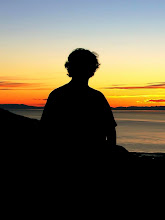I watched two documentaries -
Encounters at the End of the World (Werner Herzog's meditation on Antarctica and the eclectic group of people who gravitate towards it's desolate magnificence) and
Gonzo: The Life and Work of Dr. Hunter S. Thompson - and I read some more Batman comics. And then I did this thing that I have a habit of doing from time to time - I thought. What follows is a brief account of some of what came out of the depths of my considerably dark mind. Do enjoy.
Hunter S. Thompson lived an eventful life to say the least. But
who was he? To me he was Cicero reborn as an angry jester - the 60's version of Akira Kurosawa's Kyoami from Ran. As
Gonzo, he had the courage of conviction to give voice to the angst that most of us feel but try to ignore and a way with words that forced the meek and the strong alike to stop and take notice. He shocked the timid among us and rattled the cages of the powerful. But such power exacts a heavy price - Gonzo was a clown face that Hunter Thompson could never take off. Just as Bruce Wayne was reduced to little more than a mask that Batman wears during the day, Hunter Thompson, the man, was little more than a vessel for Gonzo. And like Batman, Gonzo is a being with an unquenchable fire of anger burning within his heart - to sustain such a fire means fueling it with one's very life force. And there's only so much wood in the pile. (This is where Bruce Wayne has the advantage of being fictional.) Such men burn bright, a shining beacon, but they burn through life quicker than most - in the end, one must either retire the firebrand alter-ego or face annihilation. Unable to give up being Gonzo perhaps, but without the energy reserves to sustain him much longer, Hunter Thompson took his own life, leaving a note that read, "
No More Games. No More Bombs. No More Walking. No More Fun. No More Swimming. 67. That is 17 years past 50. 17 more than I needed or wanted. Boring. I am always bitchy. No Fun — for anybody. 67. You are getting Greedy. Act your old age. Relax — This won't hurt."
When it happened, Thompson's suicide came as no surprise to those who knew him for he had always foretold his end by his own hand, viewing it as a way of dealing with death on his own terms. And that leads me to my next question. Why would any man look upon suicide with such romance? Well, let me begin with a brief segway. Interviewing a reclusive/taciturn penguin researcher in "Encounters ...", Herzog asks, "Do penguins ever go insane? Do they ever commit suicide?" The footage that follows is of a lone penguin breaking away from his colony and walking towards the interior of the continent, towards certain death. There is undeniable power in the image of the lone penguin awkwardly waddling into the vast, desolate expanse of the Antarctic. But why? Well, why do we celebrate tragedy in song, in verse and in prose? The magnetism and romance of sorrow are undeniable. Perhaps it is an expression of the sub-conscious mind reveling in the 'human condition'. Nonetheless, it is this attitude taken to an extreme that leads some of us to see romance in suicide. While I myself no longer hold such a view, I can understand it to a degree.
A lot of us are lazy - physically, intellectually, morally... in more ways than there are words to describe. Observeing the challenges that life throws at some of us, through a veil of laziness, one is often left in doubt of one's ability to cope with adversity. Suicide begins to look more and more like a convenient emergency exit. Add to the mix ideas like reincarnation and the finite nature of our existence is no longer a significant issue. And in an attempt to rationalize a lack of moral fortitude, one begins to paint a rosy picture of suicide as an honorable way out. This could easily happen to a man who's lived long enough, burning his candle at both ends. Rather than sacrifice his ego to give up the hard life, such a man may well decide to check out early from this mortal coil.
This is not to say that all the people who commit suicide are entirelyto blame for their predicament. There are the less fortunate among us who see nothing more than boundless misery in life and are left drained of hope, thanks to the apathy of their fellow men. When such men chose to take their own lives, everyone of us selfish people deserve equal blame. Civilization, by definition, can not function without an element of altruism. Having ranted at length on this topic in several of my previous posts, I will say no more on the topic... for the moment.
P.S. Describing the Antarctic as desolate magnificience is an undoubtedly lame play on Buzz Aldrin's description of the lunar surface and was therefore, irresistable to me.
